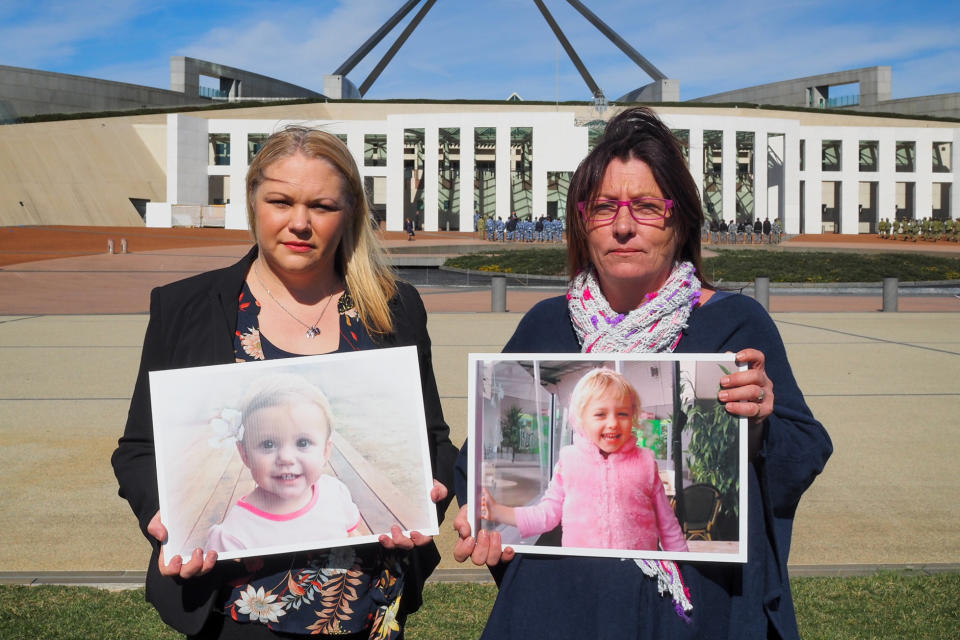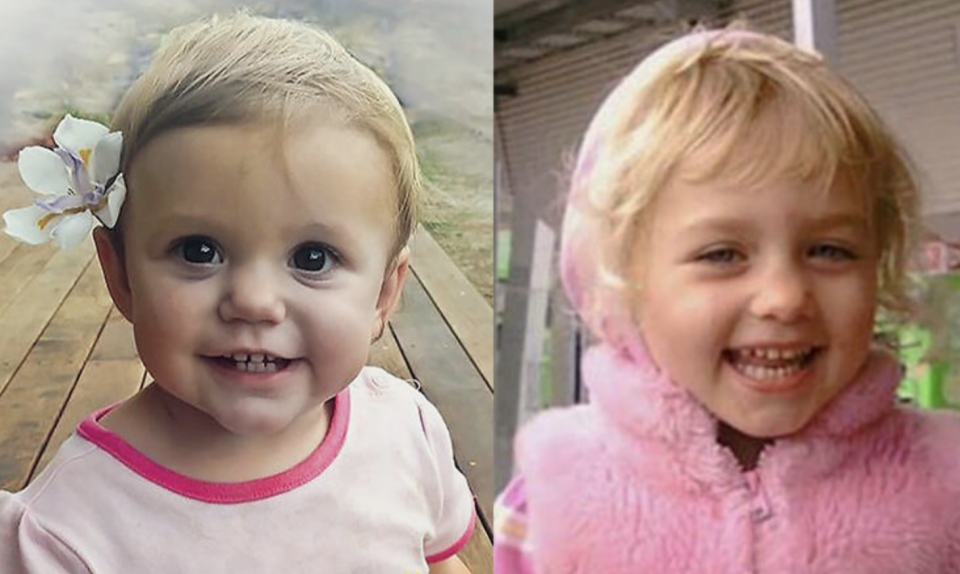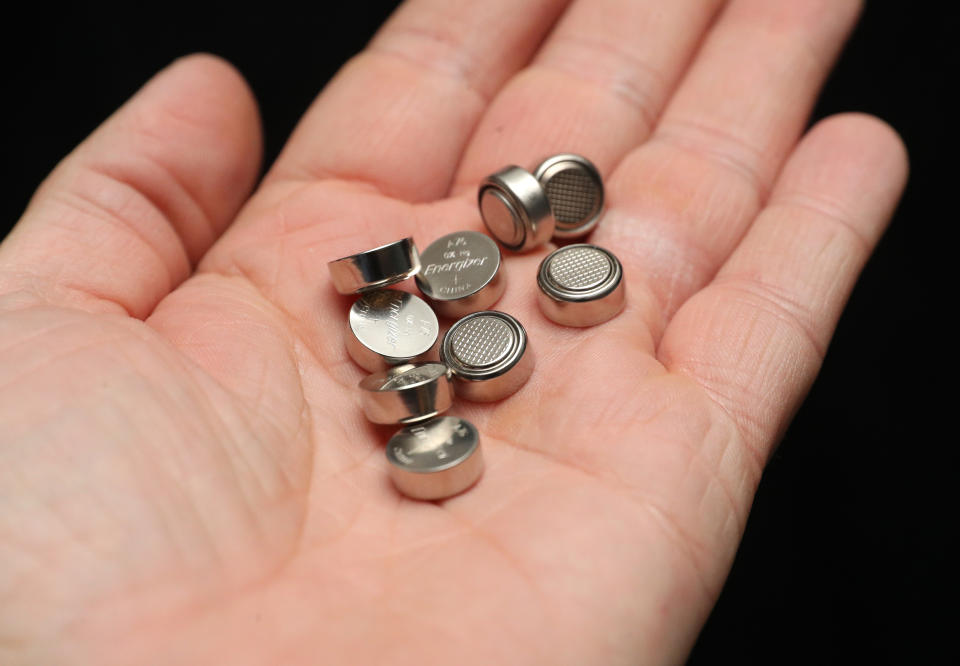'It's simply not right': Mums' fight after daughters killed by everyday item
It’s been more than four years since Allison Rees held her 14-month-old daughter Isabella in her arms and said goodbye.
The death left the Victorian mother “lost and broken” but she continues to fight so it doesn’t keep happening to other Australian families.
In 2015, Isabella swallowed a button battery and died as a result of the damage it caused when it lodged in her oesophagus.
Like many parents, Ms Rees wasn’t aware of the potential danger posed by the seemingly innocuous item - and years later she wants to see things change.
"It's too late for Bella, but it's not too late for everyone else," she said.
Ms Rees was among a group of parents and doctors who converged on Parliament House in Canberra earlier this week to call for the Australian government to make it illegal to sell unsafe toys.
Also in the group was Andrea Shoesmith, who lost her daughter Summer who died in 2013 after ingesting a button battery. Since then she has tried to lobby for change but feels "fobbed off".

Consumer advocacy group CHOICE is behind the campaign to bolster product safety laws, calling for tougher stricter rules on the sale of potentially dangerous products in Australia.
“Most Australians don’t realise that it’s not currently illegal to sell products in Australia that are unsafe, so we see many products on our markets, on our shelves that result in serious injury, and indeed death,” said CHOICE chief executive Alan Kirkland during the gathering at Parliament House on Wednesday.
“This is simply not good enough, what we need is a clear, strong, simple law that says if you’re going to make, import or sell goods in Australia it’s up to you to make sure they are safe before they’re released for consumers to use.”
The group met with the office of the Assistant Treasurer, the Shadow Assistant Treasurer and a number of backbenchers to raise their concerns, Mr Kirkland told Yahoo News Australia.
“The way our consumer law works at the moment is that it’s reactive. We wait until people are injured or die before we then step in and recall a product,” he said. “What we are calling for is a proactive approach to the law.”
Innocuous items that can turn dangerous
In August this year, the Australian Competition and Consumer Commission (ACCC) established a Button Battery Taskforce to investigate ways to reduce risk to the Australian community, particularly children, of button batteries.
The items are used in a broad range of personal and household products such as toys and games, remote controls for appliances and electronics, garage door openers and key fobs, torches, kitchen scales, musical greeting cards, and other accessories.
The ACCC will be providing draft recommendations to government by the end of 2019, with a final recommendation to be made in 2020.
Those advocating for tougher regulations around the issue, Mr Kirkland said, hope that any changes would bring about better product design. For example, having compartments that are better secured and ensuring batteries can’t fall out if a product is dropped.

Button batteries swallowed by children can become lodged in the oesophagus, leading to serious injuries, paralysis or death.
There had been 17 cases of kids being seriously injured after swallowing the batteries since December 2017, plus two deaths.
CHOICE said it found 10 out of 17 button battery-powered household items were dangerous.
The consumer group also pointed to other baby products, like strollers, cots and portable cots, which had high failure rates.
Over 50 per cent of the 173 cots tested by the group since 2012 had failed.
Even worse, 83 per cent of 163 strollers tested since 2012 failed, as did 98 per cent of 60 portable cots tested since 2011.
Calls for harsher penalties
Under the Australian Consumer Law, Commonwealth, state and territory ministers can regulate consumer goods and product-related services by issuing safety warning notices.
They can also ban products on a temporary or permanent basis, impose mandatory safety standards or issue a compulsory recall notice to suppliers.
Meanwhile, consumer guarantees give the buying public the right to a refund if a product is unsafe.
Professor Gail Pearson from the University of Sydney Business School said there is a robust system of product safety measures in Australia at a federal and state level.
“Many products do need to adhere to safety standards,” she said.
She pointed to state government bodies such as Fair Trading NSW that do “a fabulous job” of ensuring unsafe products are removed from the marketplace, but said it was an impossible task for regulators to keep out all dangerous products.
“There are lots of standards that retailers are obliged to observe,” she said. “Talking about criminal penalties, that’s a different matter.”

She acknowledged the particular problem with button batteries, suggesting a stricter approach was warranted when it comes to that particular item.
Mr Kirkland said companies should face large fines for flooding the market with "unsafe junk".
"It's essential that parliament be forced to take this problem seriously," he said.
The CHOICE boss said the group is optimistic the changes will be made but would like to see more urgency.
- With AAP
Do you have a story tip? Email: newsroomau@yahoonews.com.
You can also follow us on Facebook and Twitter, download the Yahoo News app from the App Store or Google Play and stay up to date with the latest news with Yahoo’s daily newsletter. Sign up here.


